John Janaro's Blog, page 19
December 10, 2024
Christina Grimmie Still “Shines Her Light” at Christmas Time
 Christina Grimmie never made a “Christmas Album” but she did stream two (originally “live”) Christmas concerts on a platform called Stageit. Both are preserved in recorded form on YouTube. There is also her astonishing rendition of “O Holy Night” from December 2011.
Christina Grimmie never made a “Christmas Album” but she did stream two (originally “live”) Christmas concerts on a platform called Stageit. Both are preserved in recorded form on YouTube. There is also her astonishing rendition of “O Holy Night” from December 2011.In 2015, Christina recorded an a-cappella rendition of the traditional Advent hymn “O Come, O Come, Emmanuel” which is also still on YouTube. I just stumbled on a selection of it on an Instagram Reel, and it gave me a fresh reminder of how much Christina Grimmie’s image and voice have marked these holy seasons for me and for so many other people, even today—8 years and 6 months since she was gunned down by a deranged concertgoer at an open meet-and-greet after a show in Orlando, Florida on June 10, 2016.
Christina loved Christmas, and never hesitated to share the reason why: her deep faith and love for Jesus Christ. Her faith still bears fruit today and her love still touches people’s lives through videos, which—even when she sang secular pop songs (which was most of the time)—were crafted with her great desire to give of herself and use her phenomenal vocal and musical talent to reach out and make the Internet a more human place, a place of encouragement and friendship.
This LINK will take you to that Instagram Reel I shared. The full song (nearly three beautiful minutes long) is available on YouTube at this LINK2. For a post I wrote in 2017 about “A Christina Grimmie Christmas,” open this LINK3.
As we prepare for the coming of Christ in days to come, many people (including me) will find encouragement once again in the joyful soul of Christina Victoria Grimmie (March 12, 1994 — June 10, 2016).

December 9, 2024
Immaculate Conception and the “Guadalupe Days” are Here
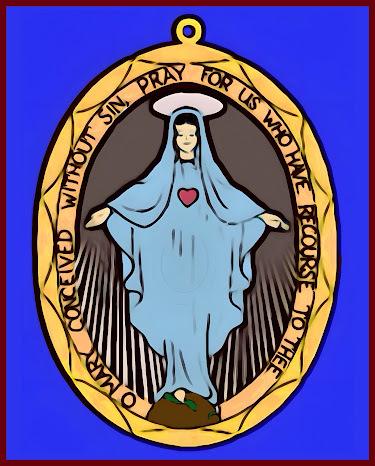 In the U.S.A., the Solemnity of the Immaculate Conception of the Blessed Virgin Mary was moved to TODAY (because yesterday was the Second Sunday of Advent); today would ordinarily be the memorial of Saint Juan Diego, who first saw “La Virgencita” on Tepeyac hill outside of Mexico City on this day in 1531. In fact, the Immaculate Conception used to be celebrated on December 9 in some places in the Roman Church (and the Eastern churches celebrate “the Conception of Saint Anne” every year on December 9, incorporating ancient traditions about Mary’s parents). Juan Diego was actually traveling to Mass for this feast day when the Mother of God first appeared to him and commissioned him to be her “messenger” to the bishop.
In the U.S.A., the Solemnity of the Immaculate Conception of the Blessed Virgin Mary was moved to TODAY (because yesterday was the Second Sunday of Advent); today would ordinarily be the memorial of Saint Juan Diego, who first saw “La Virgencita” on Tepeyac hill outside of Mexico City on this day in 1531. In fact, the Immaculate Conception used to be celebrated on December 9 in some places in the Roman Church (and the Eastern churches celebrate “the Conception of Saint Anne” every year on December 9, incorporating ancient traditions about Mary’s parents). Juan Diego was actually traveling to Mass for this feast day when the Mother of God first appeared to him and commissioned him to be her “messenger” to the bishop.Thus, the “Guadalupe Days” have begun once again, to culminate on December 12, when we commemorate the gift of Mary's image to the world, and in a particular way to the lands and peoples of the continents we call "America."
Note that the 500th Anniversary of Guadalupe is in 2031 (a mere seven years away).
Nuestra Señora de Guadalupe can heal the wounds of our hemisphere and bring reconciliation and solidarity to our peoples. If we ask her, she will do it ... but she will make us her collaborators and we will have to work hard and be patient. Just ask Juan Diego about that!
December 7, 2024
The Gentleness of Saint Ambrose
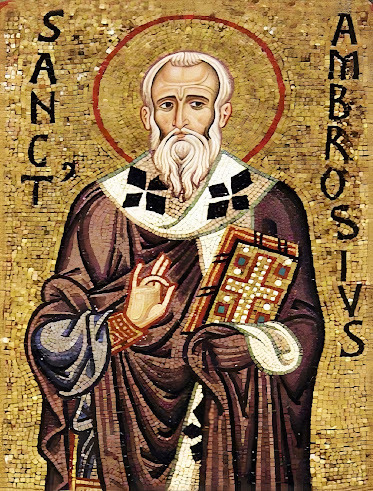 “The Lord sought [the increase of the Church] at the price of His own Blood, imitating the lovingkindness of heaven, and aiming at the redemption of all. [He] seeks this end with a gentleness which the ears of men can endure, in presence of which their hearts do not sink, nor their spirits quail.”
“The Lord sought [the increase of the Church] at the price of His own Blood, imitating the lovingkindness of heaven, and aiming at the redemption of all. [He] seeks this end with a gentleness which the ears of men can endure, in presence of which their hearts do not sink, nor their spirits quail.”Therefore, the minister of the Church “who endeavors to amend the faults of human weakness ought to bear this very weakness on his own shoulders, let it weigh upon himself, not cast it off. For we read that the Shepherd in the Gospel carried the weary sheep, and did not cast it off… For how shall he offer himself to you for healing whom you despise, who thinks that he will be an object of contempt, not of compassion, to his physician?
“Therefore the Lord Jesus had compassion upon us in order to call us to Himself, not frighten us away. He came in meekness, He came in humility, and so He said: ‘Come to Me, all you who labor and are heavy laden, and I will refresh you.’ So, then, the Lord Jesus refreshes, and does not shut out nor cast off, and fitly chose such disciples as should be interpreters of the Lord’s will, as should gather together and not drive away the people of God.
“Whence it is clear that they are not to be counted amongst the [faithful] disciples of Christ, who think that harsh and proud opinions should be followed rather than such as are gentle and meek; persons who, while they themselves seek God’s mercy, deny it to others…[for] no one can repent to good purpose unless he hopes for mercy.”
~Saint Ambrose, Concerning Repentance I:1
December 4, 2024
"He Will Destroy Death Forever"
 "On this mountain [the Lord] will destroy the veil that veils all peoples, the web that is woven over all nations; he will destroy death forever. The Lord God will wipe away the tears from all faces; the reproach of his people he will remove from the whole earth; for the Lord has spoken.
"On this mountain [the Lord] will destroy the veil that veils all peoples, the web that is woven over all nations; he will destroy death forever. The Lord God will wipe away the tears from all faces; the reproach of his people he will remove from the whole earth; for the Lord has spoken."On that day it will be said: 'Behold our God, to whom we looked to save us! This is the Lord for whom we looked; let us rejoice and be glad that he has saved us!' For the hand of the Lord will rest on this mountain."
~Isaiah 25:7-10
December 2, 2024
We Must BE VIGILANT to See the Fullness of Human Dignity
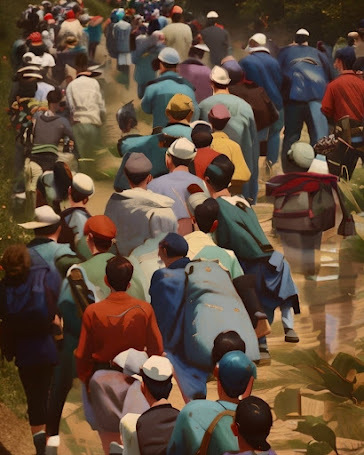 The Gospel for the First Sunday of Advent sets a crucially important tone for our Advent expectation, reminding us that we belong to Christ, that Christ is our hope. We are called to lift up our hearts to Him, to recognize our true identity and destiny in Him. Advent is a time to “stand up straight and raise our heads” in expectation of Christ’s coming, and the fullness of our redemption which will reveal the truth of every moment of our lives—the total meaning of our history and the joys and sorrows, the gifts and creative engagements, the suffering and endurance of our lives. This particularly intense Gospel passage deserves our meditation and reflection:
The Gospel for the First Sunday of Advent sets a crucially important tone for our Advent expectation, reminding us that we belong to Christ, that Christ is our hope. We are called to lift up our hearts to Him, to recognize our true identity and destiny in Him. Advent is a time to “stand up straight and raise our heads” in expectation of Christ’s coming, and the fullness of our redemption which will reveal the truth of every moment of our lives—the total meaning of our history and the joys and sorrows, the gifts and creative engagements, the suffering and endurance of our lives. This particularly intense Gospel passage deserves our meditation and reflection:Jesus said to his disciples: “There will be signs in the sun, the moon, and the stars, and on earth nations will be in dismay, perplexed by the roaring of the sea and the waves. People will die of fright in anticipation of what is coming upon the world, for the powers of the heavens will be shaken. And then they will see the Son of Man coming in a cloud with power and great glory. But when these signs begin to happen, stand erect and raise your heads because your redemption is at hand.
“Beware that your hearts do not become drowsy from carousing and drunkenness and the anxieties of daily life, and that day catch you by surprise like a trap. For that day will assault everyone who lives on the face of the earth. Be vigilant at all times and pray that you have the strength to escape the tribulations that are imminent and to stand before the Son of Man” (Luke 21:25-28, 34-36).
This season invites us to “run forward to meet” Jesus Christ who was born into this world, who lived and died for us, who conquered sin and death and is risen in His glorified humanity to draw all things to Himself. We are exhorted to “run forward to meet” Christ who comes to each of us in this moment, now, to empower us to see that the promise and the measure of this moment—of every moment—is His dwelling-with-us as the wondrous, unforeseen, incalculable gift of the Father’s infinite mercy and love.
We are also reminded to be vigilant and awake with welcoming hearts, with the hope and love that the Holy Spirit stirs up and sustains in us, and to guard against losing our focus on the face of Jesus. Advent reminds us that we must not allow our minds to be “weighed down” by distraction, discouragement, or forgetfulness of our supernatural destiny as co-heirs with Christ in the Kingdom of His Father.
The vigilant expectation of Jesus Christ “coming to us” and “dwelling among us” must be concrete and pervasive, transforming our minds and shaping the scope and criteria by which we judge every aspect of our lives. This does not mean reducing Christianity to an ideology that has pre-formulated answers to every concrete problem we face. Our faith certainly emphasizes and deepens our humanity, sheds light on the fundamental features of human dignity, and transforms our perspective and motivation for “loving our neighbor as ourselves.” It is natural for us to perceive that the human person in front of us is worthy of love. All people of good will—people who, although limited and fragile and often confused, seek the truth as something greater than themselves—are moved to express love and reverence for the dignity of every human person. Even if they are mistaken about the scope and demands of human dignity—even if their myopic and mistaken intentions lead to violent and tragic consequences that they do not yet recognize—people still know in the depths of their consciences that other human persons are their brothers and sisters who deserve respect, justice, equity, and a merciful love that opens up to the personhood and freedom of the “other.”
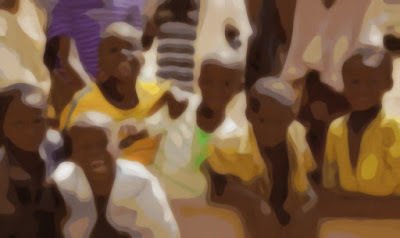 This basic loving recognition of human dignity (along with many mistaken judgments, confusion and sometimes violent failures to recognize human persons in specific circumstances) is common to Christians and people of other religions or other perspectives and “places” in their journey toward the truth—the mystery that gives ultimate meaning and purpose to human life. Our adherence to Jesus Christ, however, transforms the way we perceive and value human dignity. We have encountered the Mystery who has united human nature with Himself in a gratuitous outpouring of His love. By becoming fully human—like us in all things but sin—He has “consecrated” everything pertaining to human dignity. He has made our nature His own, as the gratuitous expression of His mercy and love that redeems and transfigures humanity. He has “in a certain sense united Himself with every human being” (see Gaudium et Spes 22). We know that every human person is made for Christ, and has the vocation to belong to Christ so as to share forever in the glory of the God who has revealed Himself as Absolute Love. The Holy Spirit wants to shape our experience so that we recognize ever more concretely that whatever we do to the least of our human brothers and sisters, we do to Christ. This is the truth about reality as it actually is, right now. It opens up, elevates, and transforms our perspective on “loving our neighbor” and “loving ourselves” out of the awareness that He loves us, that He is present, He is “with us” and that He “is coming” to transform us and ultimately fulfill us in Himself.
This basic loving recognition of human dignity (along with many mistaken judgments, confusion and sometimes violent failures to recognize human persons in specific circumstances) is common to Christians and people of other religions or other perspectives and “places” in their journey toward the truth—the mystery that gives ultimate meaning and purpose to human life. Our adherence to Jesus Christ, however, transforms the way we perceive and value human dignity. We have encountered the Mystery who has united human nature with Himself in a gratuitous outpouring of His love. By becoming fully human—like us in all things but sin—He has “consecrated” everything pertaining to human dignity. He has made our nature His own, as the gratuitous expression of His mercy and love that redeems and transfigures humanity. He has “in a certain sense united Himself with every human being” (see Gaudium et Spes 22). We know that every human person is made for Christ, and has the vocation to belong to Christ so as to share forever in the glory of the God who has revealed Himself as Absolute Love. The Holy Spirit wants to shape our experience so that we recognize ever more concretely that whatever we do to the least of our human brothers and sisters, we do to Christ. This is the truth about reality as it actually is, right now. It opens up, elevates, and transforms our perspective on “loving our neighbor” and “loving ourselves” out of the awareness that He loves us, that He is present, He is “with us” and that He “is coming” to transform us and ultimately fulfill us in Himself. His presence clarifies many of our responsibilities toward one another, but He doesn’t give us “all the answers” to every human difficulty we face in this life. He doesn’t give us an “absolute ideology” but rather draws us to a greater love. We do not yet see the whole of His plan for us, but we are given “new eyes”—the eyes of faith to recognize His presence among us and to welcome His “coming among us” in new ways. For this—the unfolding of our vocation, our journey toward His fullness—we must be vigilant with a ready expectation. However daunting and difficult the circumstances of His coming may be, we must trust the Holy Spirit to renew in us the vitality of faith, hope, and love (caritas) that empower us to recognize Him and respond to Him. For Christ comes among us especially in the poor and afflicted, and through them He begs for our recognition and love.
In light of this universally inclusive (i.e. Catholic) perspective on human dignity, I want to give special consideration this Advent to the global social crisis that involves hundreds of millions of migrants, refugees, and displaced persons. The unimaginable poverty of these human persons challenges my own worldly complacency and self-satisfaction. I don’t know how to “solve the problem” or relieve the countless miseries, but I don’t want to be careless, asleep, and disconnected from my brothers and sisters who suffer; I want to wake up and listen to the voice of Christ who begs for my love through them. I pray that His begging voice will awaken me, my fellow Catholic Christians, all other Christians, and the whole wider community of people of good will, to have a “preferential option” for these poor persons whose afflictions and needs are so evident, and to inspire in us vigilance, confidence, and creativity that overcome our fears and enable us to do whatever we can to respond to their cries (which are the cries of the Heart of Jesus).
This call to attention and response—responsibility for the recognition of human dignity—addresses itself in a particular way to my nation and, in various ways, all the wealthy nations of the world. There are many Christians among us—good, generous Christians—who place their hope in Christ and seek to follow Him and show forth His glory in today’s world. We are especially called to vigilance in the present moment regarding many things, but it is illustrative to look at this one specific circumstance which we might be tempted to ignore or assess with reductive criteria that subtly set aside the ardor of the merciful love of the Heart of Jesus.
I say this to myself as much as to anyone else: We must be vigilant. We must not become “drunk” on the illusions of worldly success, or on the fantasies of political and social leaders who promise to “make us great” according to the measure of this world—fragile and imperiled promises of “tribal self-affirmation” that inevitably require us to turn our backs on Christ present in our brothers and sisters in desperate need. They are the “Lazaruses” who long for scraps from our overfilled banquet tables: victims of violence and intractable circumstances of human misery, crying out to us who have been blessed with immense material wealth—with material comforts, technological riches, and power never before seen in the history of the human race.
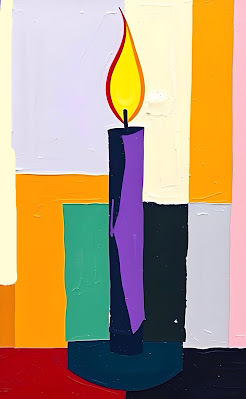 Advent reminds us that Jesus comes to us in the midst of these migrants and refugees who are our neighbors, and that Jesus in the poor makes a claim on us—He calls us to act responsibly with the wealth He has given to us who live in the rich nations of the world. This “claim,” as such, doesn’t require advocacy for any particular partisan political plan, much less agitation for “revolution” (which the bitter experience of the twentieth century has proven to be fruitless; it is another kind of “drunkenness” that forgets Christ and unleashes more violence). What is primary and fundamental is the need to recognize Christ in these suffering people so as to see and judge the problem as it really is, and to follow Him in being protagonists of creative responsibility that embodies the works of mercy, that seeks to generate spaces where people can make homes, reunite families, and find dignified work.
Advent reminds us that Jesus comes to us in the midst of these migrants and refugees who are our neighbors, and that Jesus in the poor makes a claim on us—He calls us to act responsibly with the wealth He has given to us who live in the rich nations of the world. This “claim,” as such, doesn’t require advocacy for any particular partisan political plan, much less agitation for “revolution” (which the bitter experience of the twentieth century has proven to be fruitless; it is another kind of “drunkenness” that forgets Christ and unleashes more violence). What is primary and fundamental is the need to recognize Christ in these suffering people so as to see and judge the problem as it really is, and to follow Him in being protagonists of creative responsibility that embodies the works of mercy, that seeks to generate spaces where people can make homes, reunite families, and find dignified work.There is no denying that this is an enormous crisis that seems overwhelming in its implications. “Nations [are] in dismay, perplexed by the roaring of the sea and the waves,” but in this case the roaring waves are millions of human persons, uprooted from their homes by war, indigence, persecution, and/or civil chaos that threatens the most basic requirements of human living. They are joined by immigrants who often come from very poor countries with the hope of a better way of life for themselves and their families even at the bottom rung of the economic ladder in rich neighboring countries. The disparity of lifestyle is enormous—some in Latin America have said about their North American neighbors that “your dogs live better than we do.” Having seen the poverty with my own eyes in several intensive visits to Mexico, I can only confirm that—at least for some people (too many people)—this statement is true. Certainly there are many organizations that work to help these people. Unfortunately, there are others who prey on their vulnerability.
This is an incredibly complex crisis that cannot be resolved quickly or easily. This is why we must be vigilant, we must “keep watch” for ways to open roads and spaces for Christian and human dignity. We must watch and pray, sacrifice and “co-suffer” with these people who are our brothers and sisters, seeing in them Christ who is “coming” to us. This does not mean we should join the most extreme ideological partisan movements, or surrender our rational capacity for prudential judgment and be taken in by facile or naive solutions that promise to “fix everything”; rather we must begin by remembering that we are searching for ways to welcome Christ in the stranger and give Christ in the homeless a place to live with dignity. He is the Lord of history even in these tumultuous times, and He will show us how to follow Him and accompany one another, enfolding us all in His Most Compassionate Heart, opening our eyes to His way of seeing and judging adequately all the problems we face in life. We must not be paralyzed by fear. “Do not be afraid. Open wide the doors to Christ” (Saint John Paul II)—Open wide the doors of our lives, our societies, our cultures, and every aspect of this wild, fascinating, perilous, unpredictable moment in history that He has entrusted to us. Open wide the doors to Christ! He “is the center of the cosmos and history” (John Paul II, Redemptor Hominis 1).
But in the disorganized and unmanageable movements of vast numbers of people, how can we not be afraid? In their anxiety, the rich nations fear being overrun, and they fear the lawless and violent elements that inevitably emerge or attach themselves to the desperation of the neglected poor. This points to a reasonable concern that cannot be ignored, but if it becomes the main criterion for judging the response of wealthy peoples to this huge and increasing human crisis of our times, then Jesus has been forgotten. A proper and reasonable concern for the common good in the regional spheres of this unprecedentedly interconnected world (with all its expansive possibilities and monstrous dangers) requires attention to restraining the criminal and violent elements, and international collaboration in seeking ways to reduce them or reform the problems that engender them and foster their growth. But anxiety will not help us; it will only make us obtuse in front of the full meaning of what is really happening. We must bring these cares, these deeply human concerns about our world to Him, trust in Him, and ask Him to enlighten our minds and enlarge our hearts.
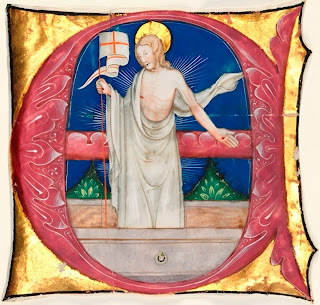 We must be vigilant here, to see the face of Jesus and the dignity of the human person in need, and (in whatever way we can) to serve Him in them. This is a mentality that cannot (and must not) be reduced to any of the misperceptions and more-or-less dehumanizing strategies of any party on the current political spectrum. Be vigilant. Don’t become “drowsy” with the drunkenness of false enthusiasm for the “greatness” of our own “tribe,” or discouraged by the dark paralysis of anxiety in the face of an impossible danger. Christ is coming, and He knows what He is asking of us. Let us turn to Him and allow Him to renew our perspective on all things, with confidence that all things belong to Him and are expressions of His merciful love.
We must be vigilant here, to see the face of Jesus and the dignity of the human person in need, and (in whatever way we can) to serve Him in them. This is a mentality that cannot (and must not) be reduced to any of the misperceptions and more-or-less dehumanizing strategies of any party on the current political spectrum. Be vigilant. Don’t become “drowsy” with the drunkenness of false enthusiasm for the “greatness” of our own “tribe,” or discouraged by the dark paralysis of anxiety in the face of an impossible danger. Christ is coming, and He knows what He is asking of us. Let us turn to Him and allow Him to renew our perspective on all things, with confidence that all things belong to Him and are expressions of His merciful love.This pertains to everything in our lives and in death itself. We have joys, sorrows, and tribulations, but we grow in all things by adhering to Jesus, by staying with and walking with the One who has loved us and who is coming to save us.
December 1, 2024
Advent 2024
November 30, 2024
Saint Andrew the “First-Called”
 The Gospels give us various accounts of the details and circumstances in which Jesus began his public ministry and called his disciples. They include extraordinary events and memorable gestures. But there is one story that is remarkable precisely because it seems so “ordinary.” We might easily miss its significance.
The Gospels give us various accounts of the details and circumstances in which Jesus began his public ministry and called his disciples. They include extraordinary events and memorable gestures. But there is one story that is remarkable precisely because it seems so “ordinary.” We might easily miss its significance.John’s Gospel makes a brief, mysterious reference to the day when he and Andrew met Jesus for the first time (John 1:35-41). The context of this event is important: it takes place a day after John the Baptist’s testimony regarding “the Lamb of God, who takes away the sins of the world” (John 1:29). The story involves two disciples of John the Baptist, one identified as Andrew. The other disciple is not named, but the familiar nature of the account has generally favored the assumption that it was the author of the Gospel himself, Saint John the Apostle and Evangelist. Scripture scholars have various theories about his identity, and about how to integrate the multiple “vocational narratives” (in different Gospels) regarding the famous fisherman and family business partners Peter and Andrew, John and James. We cannot address these theories here. It suffices to note that the relatively humble status of running a fishing business based in Galilee would not have prevented these men from joining the large “popular movement” that John the Baptist engendered. It was precisely the “ordinary people” who followed the Baptist, passed through the waters of the Jordan, and took his preaching to heart. This is a story about two such people:
“The next day John [the Baptist] was there again with two of his disciples, and as he watched Jesus walk by, he said, ‘Behold, the Lamb of God.’ The two disciples heard what he said and followed Jesus. Jesus turned and saw them following him and said to them, ‘What are you looking for?’ They said to him, ‘Rabbi’ (which translated means Teacher), ‘where are you staying?’ He said to them, ‘Come, and you will see.’ So they went and saw where he was staying, and they stayed with him that day. It was about four in the afternoon. Andrew, the brother of Simon Peter, was one of the two who heard John and followed Jesus. He first found his own brother Simon and told him, ‘We have found the Messiah’” (John 1:35-41).
What happened here? Two men follow Jesus. A brief conversation. They stay with Jesus. It was four in the afternoon. But then Andrew seeks out his brother and says, “We have found the Messiah!”
Why was his heart so moved, so engaged, so convinced about this man he had just met? Jesus had no disciples yet. No miracle is recounted here (the fish-catching episode would come later). Andrew hardly knows what “Messiah” means (and it will take a long time for him and the others to learn) but he knows something after this first encounter with Jesus. It’s enough to change his life, and lead him to share what he and ‘the other disciple’ have found.
What happened, on that day, at four o’clock in the afternoon?
It was a human encounter in which Andrew and John met the Person through whom and for whom they had been created, the Word made flesh.
It was the beginning of the story of conversion, the story of meeting Jesus, following Jesus and sharing him with others.
November 29, 2024
The Conversion of Dorothy Day
 This brief account of the Servant of God Dorothy Day’s conversion to Christ in the Catholic Church was published in my monthly column in Magnificat way back in October 2017. After many decades of prayer and service to the poor, Dorothy Day died on November 29, 1980.
This brief account of the Servant of God Dorothy Day’s conversion to Christ in the Catholic Church was published in my monthly column in Magnificat way back in October 2017. After many decades of prayer and service to the poor, Dorothy Day died on November 29, 1980.Dorothy Day tells her own conversion story in the first part of her beautiful, soul-searching memoir, The Long Loneliness. She was born in 1897 in Brooklyn, and she grew up in different cities in the United States as the family followed the fortunes of her father who was a newspaper reporter. Though there was no religion at home, Dorothy was exposed to Christianity at a very early age by her neighbors. She was an avid reader who studied the Bible and was baptized Episcopalian, and she believed in Christianity as a youth. She also read the literature of her time, often dealing with the plight of the poor, whom she saw all around her in the urban environment of those days. The twofold attraction to Jesus and to the poor was present in her life almost from the beginning.
In college, however, Dorothy became disillusioned with Christianity because so many Christians seemed to ignore the poor. She joined socialist and anarchist circles, becoming a reporter for their journals in New York. While Dorothy writes with admiration of the sacrifices and generosity of her non-believing friends, she admits that she herself lived a self-centered life and indulged her own desires. She had several love affairs, and in 1918 became pregnant and had an illegal abortion. Dorothy wanted to be a radical, but she wondered whether for her it was anything more than a justification for dissolute living. Meanwhile she was still drawn by God, and sometimes visited Catholic churches in New York where she found a sense of peace and also – at every Mass or devotion or anytime during the day – the poor on their knees before God, the poor she wanted to love (so many of whom, at that time, were immigrants from southern and eastern Europe).
Writing brought Dorothy some modest financial success. She bought a beach house in Staten Island and entered into a stable though irregular union with an anarchist named Forster Batterham. For several years she lived a quiet life surrounded by natural beauty, but she found that the measure of human happiness she experienced did not take away her desire to know God. Instead it heightened her desire to show gratitude to the Creator of all good things. When she became pregnant in 1925, she knew that she had to raise her child as a Christian. She turned to the place where she had always seen Christianity in a concrete form, shaping the lives of poor people every day, the Catholic Church.
Dorothy met a gruff but kind retired Sister of Charity (Sister Aloysia) who taught her the Catechism (and eventually became her godmother). She had her baby daughter baptized, but hesitated herself for another year because of Forster’s objections to organized religion. She realized they would have to be separated if she became Catholic, but she eventually chose to follow God and entered the Church. She was also following God’s poor, even though many Catholics—like other Christians—did not seem to care much about them. Dorothy, however, had seen them in the churches and known them in the slums. She knew that it was the will of Christ to serve Him in the poor and defend their dignity. This became the source of her immensely fruitful vocation to found the Catholic Worker movement.
November 27, 2024
Transfigured By the Presence of God
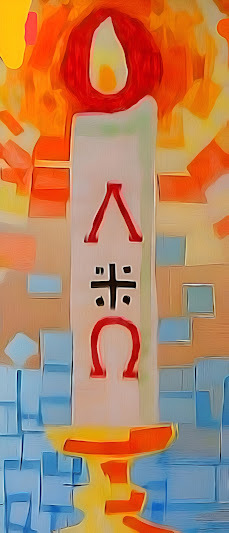 “In our world immersed in the sadness of wars and multiple crises, let us announce the joy of the Gospel through our lives transfigured by the presence of God” (Pope Francis).
“In our world immersed in the sadness of wars and multiple crises, let us announce the joy of the Gospel through our lives transfigured by the presence of God” (Pope Francis).This quotation is very profound and significant. It challenges not only nations and political leaders, but every one of us.
The crucial necessity in “announc[ing] the joy of the Gospel” is our own ongoing experience of a life-changing encounter with Jesus. People will be drawn to Christ by our living in a new way. The grace of the Holy Spirit who has been given to us is also working mysteriously in the heart of every person we meet.
Everyone searches for “meaning.” The meaning, significance, and purpose that every human being seeks has become a man, Jesus Christ. We are best able to communicate this “good news”—this wondrous event of the Word coming to dwell with human beings and remaining with us—by asking God to empower us to live the Gospel in every encounter with the human person.
The Lord—Pope Francis reminds us—wants to make us sharers in His eternal life, which we already begin to live by grace here and now in the present age. We are being transformed in Christ even as we journey with Him on the roads of this world. Jesus calls us to bear witness to His Gospel by the way we live our lives, by the freedom and joy we find in doing His loving and merciful will; we must evangelize “through our lives transfigured by the presence of God.”
Here are some creative illuminations of the Pope’s words:



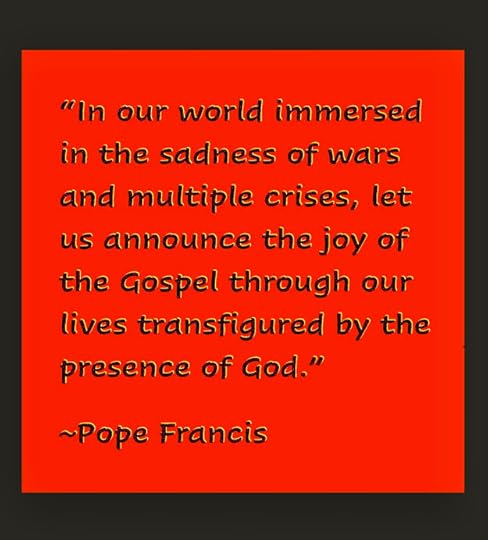

November 26, 2024
Late Autumn Maples Leaves in Dappled Sunlight
 Our Autumn season might not be as brilliant and vivid as in the Northeastern United States, but it makes up for it by being long in duration. Our deciduous trees and plants have different seasonal rhythms. Many of them turn colors and their leaves begin to fall and carpet the ground in late October/early November. Still, they are not “in a hurry,” and mostly-bare trees still wear some of their remaining leaves throughout the month of November. Meanwhile, other species (like the large maple tree in my front yard) wait until the first round of Fall colors wain, and then their leaves finally begin to let go of a summer’s worth of stubborn green. The large Maple trees flame out in bright yellow and orange leaves that remain impressive through the early days of December.
Our Autumn season might not be as brilliant and vivid as in the Northeastern United States, but it makes up for it by being long in duration. Our deciduous trees and plants have different seasonal rhythms. Many of them turn colors and their leaves begin to fall and carpet the ground in late October/early November. Still, they are not “in a hurry,” and mostly-bare trees still wear some of their remaining leaves throughout the month of November. Meanwhile, other species (like the large maple tree in my front yard) wait until the first round of Fall colors wain, and then their leaves finally begin to let go of a summer’s worth of stubborn green. The large Maple trees flame out in bright yellow and orange leaves that remain impressive through the early days of December. This was a lovely, mild day. As the nearly setting sun reached through the hills to adorn our Maple tree branches with dappled brightness, I took this picture with my phone camera. I decided that there was no need for my [digital] art to work further on this image. Nature is the artist in these circumstances, and one wishes as much as possible that the fine details of Nature’s own work might be seen with minimal human interference.
This blog has watched many Autumn seasons come and go over the years, and will continue to do so—God willing—for many years into the future.
Cultivating attention to this kind of beauty requires focus and patience. It whispers the inexhaustible goodness that surrounds us everywhere.




